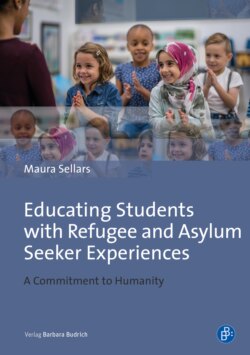Читать книгу Educating Students with Refugee and Asylum Seeker Experiences - Maura Sellars - Страница 10
На сайте Литреса книга снята с продажи.
Mass Education in a Neoliberal Paradigm
ОглавлениеThe establishment of school systems and mandatory attendance for children and young people between certain ages is not new, nor is it confined to first world countries. Similar systems have been established in most parts of the world, differing only in the detail of how they are administered (Boli et al., 1985). As society changed in response to advancements in industry, technology, the economy and world affairs, so did the nature and characteristics of education (Tait, 2013). Currently, educational policies in capitalist countries are heavily influenced by the ideologies of various versions of neo liberal economic policies. The neo liberal policies of the 1980s, although differing in the detail, resulted in the break from the Keynesian post war policies which had led to the development of systems such as Swedish social democracy and the welfare provisions in the UK (Steger & Roy, [3] 2010) . The government controlled all the flow of money in and out of the country and high taxes on the wealthy and large corporate companies were used to pay for increased social services and higher wages for workers. Neoliberalist principles championed by Thatcher in the UK and Reagan in the USA focused on a very different paradigm indeed. The common foundations of all neoliberal policies that were implemented during that period were Deregulation, Liberalism and Privatization. During the 1990s Blair in the UK and Clinton in the USA, followed by many of their trading partners, took a more moderate approach and attempted to balance this free trade model (liberalism) with more sensitivity towards the community concerns and social responsibilities that were the results of the policies in the previous decade. Global financial crisis and the establishment of the World Trade Organisation have had some impact on the nature of neoliberalism in the twenty-first century, but the cornerstone of the ideology, free trade, remains (Steger & Roy, 2010), as does the impact of this economic rationalism (Pusey, 1991) on education.
Neoliberalism has redefined education itself in the twenty-first century. In its quest to create new markets where none previously existed and to expand the existing markets, neoliberalism has had a critical impact on educational policies and practices (Connell, 2013a; Ross, 2017) and shows little sign of abating (Wilkins, 2017). Once fully established, these market reforms began to exercise power in every sphere of public life, including schools and what is understood as educational reform. These were implemented mainly as the result of the privatization of many previously owed goods and services, the open trade agreements and the reconfiguration of workforce conditions; which changed not only the ways in which people worked in terms of casual, contract and part time employment, but also the opportunities for lowly paid trade occupations where wages paid by first world countries could not compete with that paid by other countries. The effect of this was increasingly felt by the working classes. Education became aligned increasingly with an industrial model, with the introduction of measurable outcomes and high levels of accountability, much of which is reminiscent of Foucault’s panopticon theory of surveillance and monitoring (Foucault, 1977, 1979). Substantially increased funding for private schools, including religious systemic schools and independent schools, not only took much of the responsibility for educating specific groups of students away from public education systems, but led to increasing privatization of a mandatory public service as parents at distinct levels of socio economic status increasingly took advantage of a widening range of school choice. Providing society with choice is a cornerstone of neoliberal ideology and, as with other areas of public life, the promotion of school choice has been embraced by individuals who may benefit most from the neoliberal perspective of education (Angus, 2015).
[4] However beneficial the notion of school choice appears to be on the surface, in this economic political model, school choice can serve to disrupt education and minimize the potential of all students to achieve at school. Based on economic principles, not on educational philosophies and accompanying theory, neoliberalist education stresses high levels of individualism, compliance for schools and students to attain outcomes that are benchmarked by neoliberal agenda which promote hegemonic values and market this as an acceptable and appropriate world view (Angus, 2015; Connell, 2013a, 2013b; Ross, 2017; Steger & Roy, 2010). As a result, poor student performance is considered to be the responsibility of individual schools and the product of economy driven political decision which have increasingly permeated educational systems. In response, many parents who have sufficient knowledge of how systems are being managed and have adequate income to choose, become concerned that their children achieve these benchmarks and perform well at school. In order to ensure this outcome, parents who are fiscally secure are increasingly seeking out the best schools in public systems and competing for places in schools in the private sector (Angus, 2015; Connell, 2013b). Market policies ensure, that even in school choice, parents become consumers. Neoliberal educational policies not only eliminate alternative educational views but classify society increasingly on cultural and economic capital [5] (Bourdieu, 1986b, 1990; Bourdieu, Passeron, & Saint Martin, 1994). Students are classified, not on merit but on inherited status. Consequently, students from low socioeconomic backgrounds invariably attend public schools in their own socioeconomic settings. As will be discussed later, choice of school impacts heavily on individuals’ sense of identity (Angus, 2015) .
